Dr. Khoi Luong has over seven years of experience in post-acute care, long term care and has served in various leadership roles with NYC Health + Hospitals since 2016, most recently as senior vice president of post-acute care for the system. Throughout his career with NYC Health + Hospitals, Dr. Luong increased clinical capabilities across six sites, and five post-acute and long-term care facilities have been ranked as some of the best in the nation.
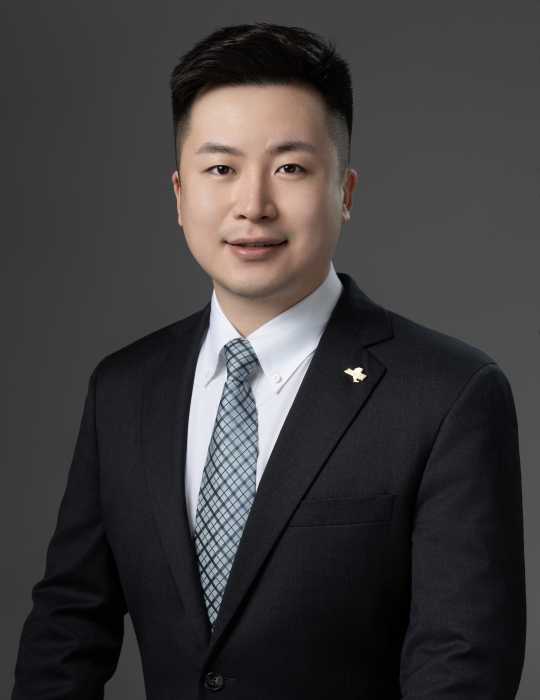
Shawn Ma
Director of Asian American Affairs, Office of Governor Kathy Hochul

Shawn Ma was appointed director of Asian American affairs for Governor Kathy Hochul. His rapid rise as a prominent advocate has been remarkable, quickly establishing him as a shining new star. He addresses significant challenges, including anti-Asian sentiment and insufficient representation. He is dedicated to fostering an environment where the contributions and rights of the AAPI community are fully recognized and respected.
If you could give your younger-self advice, what would it be?
Stay endlessly curious and embrace every opportunity to learn. Every piece of knowledge, every skill, and every interaction has the potential to contribute to your growth. Don’t shy away from challenges; they are your best teachers. And remember, kindness and empathy towards others will take you further than you can imagine. Stay patient, stay genuine, and always keep looking forward, because the path of learning is never-ending and full of surprises.
Do you have any event/movie/music suggestions for our readers to check out in celebration of AAPI Heritage Month?
I would recommend a documentary, “Photographic Justice: The Corky Lee Story.” Chinese American photographer Corky Lee tirelessly documented the celebrations, struggles, and daily lives of Asian American Pacific Islanders. Determined to push mainstream media to include AAPI culture in the visual record of American history, Lee produced an astonishing archive of nearly a million compelling photographs.
How has your heritage shaped the person you are today?
My heritage has profoundly shaped me, instilling resilience, adaptability, and a unique worldview. Bridging two cultures, I’ve learned to appreciate diversity and navigate complex challenges, which has enhanced my problem-solving skills and emotional intelligence. The values and traditions passed down from my family have shaped my ambitions and work ethic. This background has made me empathetic and versatile, enabling me to contribute meaningfully to my communities while honoring my roots and forging new paths
What can New York policymakers do to support the AAPI-community in the short-term? In the long-term?
Governor Hochul has taken significant steps to support the AAPI community, both in the short term and for generations to come. Some of those initiatives took effect immediately, like making Lunar New Year a school holiday across New York. Other efforts are long-term projects, such as her efforts to fund AAPI nonprofits and crack down on anti-AAPI hate crimes. I am proud to be working for a governor that takes the concerns of the AAPI community seriously.
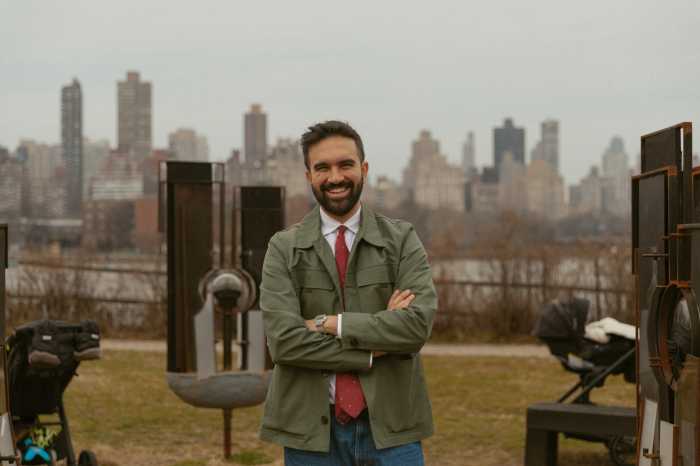
Zohran Mamdani
Assembly Member, New York State Assembly

Assembly Member Zohran Kwame Mamdani is a Democratic Socialist representing Astoria and Long Island City in the New York State Assembly. Previously a foreclosure prevention housing counselor for low-income homeowners, Zohran has continued to fight for working-class New Yorkers in and outside the legislature: hunger striking alongside taxi workers for transformative debt relief, organizing Astorians against ConEdison rate hikes, and winning legislation for MTA service frequency and a free bus pilot in NYC.
If you could give your younger-self advice, what would it be?
Be comfortable being the mongrel that you are.
Do you have any event/movie/music suggestions for our readers to check out in celebration of AAPI Heritage Month?
“Monkey Man” by Dev Patel
How has your heritage shaped the person you are today?
Being Indian and Muslim has at different times placed me on the margins of American society. To be on the margins of a society is to see the truth of it, and not just the promise of what a society aspires to be. I’ve spent much of my life trying to bridge that gap – working towards a New York where the promise of a dignified life rings true for all.
What can New York policymakers do to support the AAPI-community in the short-term? In the long-term?
The AAPI community is the fastest growing demographic in our state. Policymakers must recognize that the needs of the AAPI New Yorkers cannot only be met by organizations that serve those communities and neighborhoods. City and state government must meet the challenges of serving the AAPI community’s particular needs – whether language barriers, access barriers, stigma – and incorporate these needs into agency and policy decisions across all levels of government.
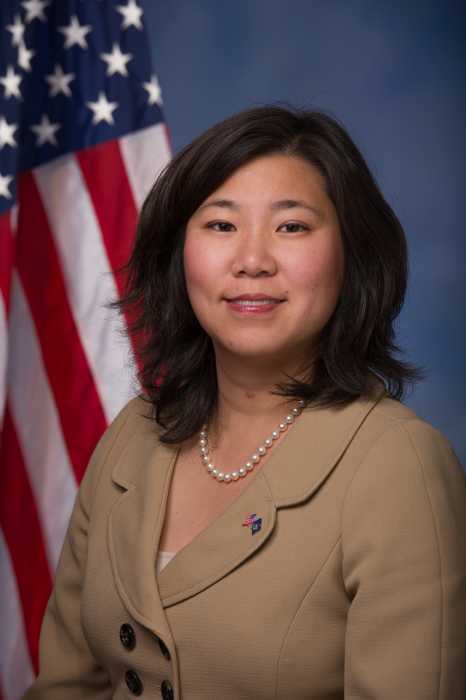
Grace Meng
U.S. Representative, United States House of Representatives

Grace Meng is serving her sixth term in Congress representing Queens and is the first and only Asian American Congress Member from NY. Born in Elmhurst and raised in Bayside-Flushing, Grace helped establish NYC’s Lunar New Year school holiday, passed legislation into law to combat anti-Asian hate, and created the first National Museum of Asian Pacific American History and Culture. She is also pushing federal holidays for Lunar New Year, Diwali, and Eid.
If you could give your younger-self advice, what would it be?
Pursue your dreams and aspirations. Start young, work hard, and don’t give up. And never be discouraged by the naysayers who tell you that you cannot achieve your goals. I would also encourage our young people to get involved in their community and to treat others the way that they want to be treated.
Do you have any event/movie/music suggestions for our readers to check out in celebration of AAPI Heritage Month?
Compared to years ago, there are many that exist today and it’s great to see how the number of AAPIs in entertainment and pop culture have grown. I would encourage everybody to check out what appeals to them whether it’s old episodes of “Fresh Off the Boat,” classics such as Teresa Teng’s “The Moon Represents My Heart,” current acts like BTS or the Linda Lindas and the many more that are out there.
How has your heritage shaped the person you are today?
When I was younger, I didn’t appreciate my heritage. In my school, there weren’t many Asian kids and my mom packed me dumplings for lunch when I just wanted a peanut butter-jelly sandwich. But as I got older, I embraced my ethnicity and realized the positive and important impact my culture has had on me. As a lawmaker, I’m now proud to fight for my community and push initiatives that improve the lives of AAPIs.
What can New York policymakers do to support the AAPI-community in the short-term? In the long-term?
In Congress, I have worked to bring more attention to the contributions that the AAPI community has made to our nation, and policymakers everywhere should do the same. AAPIs helped make the United States the great country that it is today but this history has largely been ignored. More people should understand and appreciate the role that AAPIs have played in shaping and building America. People need to realize that AAPI history IS American history.
Sanjay Mody
Partner, Windels Marx
Sanjay Mody’s law practice spans the areas of government, infrastructure and finance. At Windels Marx he advises public and private sector clients on a range of strategic, corporate and governance matters. He co-founded and leads Windels Marx’s infrastructure development and finance group. Mody previously served as senior advisor to the chairman of the Port Authority of New York and New Jersey, advising the chairman and the board of commissioners on policy, legal, and financial issues relating to the agency’s infrastructure and economic development projects.
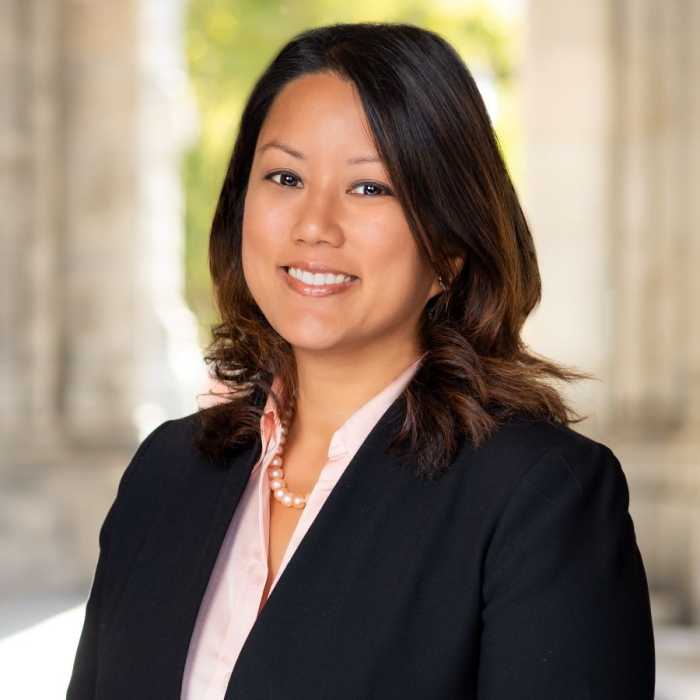
Jeanette Moy
Commissioner, NYS Office of General Services

Jeanette Moy was appointed commissioner of the New York State Office of General Services (OGS) by Governor Kathy Hochul in October 2021. Under Commissioner Moy’s leadership, OGS implemented a comprehensive strategic plan to improve how the agency operates. She is leading efforts to modernize the State’s operations and oversaw OGS’s establishment of the State’s Office of Language Access to ensure New Yorkers with limited English proficiency have access to the State’s vital services.
If you could give your younger-self advice, what would it be?
There is a phrase I think of often, particularly now that I am a parent: the days are long, but the years are short. I would advise my younger self to take the time to soak in every moment of joy, inspiration, and wisdom from each life experience. I would tell myself to push through and learn from each challenge and trial because those difficult times will also pass quickly.
Do you have any event/movie/music suggestions for our readers to check out in celebration of AAPI Heritage Month?
The NYS Capitol curatorial exhibit in the governor’s Reception Room on the second floor will run from May 1-31, as we highlight the work of the late New York City photographer Corky Lee. OGS will host its annual AAPI Heritage Month celebration on the Concourse in the Empire State Plaza in Albany on Wednesday, May 22nd, from 10 A.M. – 2 P.M.
How has your heritage shaped the person you are today?
My parents are ethnically Chinese and born and raised in Trinidad and Tobago. As a fourth-generation overseas Chinese, I never realized how different my family’s experience was until later in life. We were as likely to listen to a steel pan at the West Indian Day parade as we were to eat dim sum on Sundays. I’d like to think that makes me more likely to question assumptions and stereotypes and to be a bridge-builder.
What can New York policymakers do to support the AAPI-community in the short-term? In the long-term?
New York policymakers should ask how policies impact Asian American and Pacific Islander communities, whether it is in mental health, education, or public safety, and incorporate those answers in their work. Data is important, and AAPI communities are not monolithic with respect to English proficiency, educational attainment, income, immigration status, and community health. The pandemic and surges in anti-Asian hate crimes brought the longstanding needs of the AAPI community to the forefront. We shouldn’t let that recede.

Priya Nair
Deputy Chief Diversity Officer, Office of New York State Governor Kathy Hochul

Priya Nair is a lifelong New Yorker, strategic DEI leader, and LGBTQ+ policy expert. Priya is currently the deputy chief diversity officer for Governor Kathy Hochul. Previously, Priya served in roles throughout New York City and state government, including with NYC Health + Hospitals and the New York City Council. Priya has been recognized for their leadership by multiple outlets, such as City & State, Crain’s New York Business, and PoliticsNY and amNY Metro.
If you could give your younger-self advice, what would it be?
I would tell myself to be authentically me! As a young person, I felt pressure to be perfect and to conform to what was “popular.” I participated in activities that I was good at, rather than the ones that I enjoyed, and I didn’t explore parts of myself for fear of what other people might think. I would tell myself that you’re going to be loved and supported for being exactly who you are.
Do you have any event/movie/music suggestions for our readers to check out in celebration of AAPI Heritage Month?
As someone who grew up on my dad’s Malaysian cooking, I am always looking out for Malaysian restaurants in New York. In celebration of AAPI Heritage Month, readers can head to New York City’s Lower East Side to check out Kopitiam, a casual coffee shop and restaurant that serves Nyonya cuisine. Try their nasi lemak, hand-pulled coffee, and array of kuihs. Bonus points for supporting an Asian- and LGBTQ-owned business!
How has your heritage shaped the person you are today?
I grew up in NYC with a South Indian immigrant dad from Malaysia and an Italian American Mom. My experience as a mixed-race person allowed me to understand at an early age what it felt like to be different, which deepened my empathy and curiosity for other people. My heritage also taught me the importance of understanding our histories and drawing strength from our ancestors as we make a better world for the future.
What can New York policymakers do to support the AAPI-community in the short-term? In the long-term?
It’s important to listen to and be responsive to the needs of AAPI New Yorkers. For example, Governor Hochul established the Hate and Bias Prevention Unit to help combat prejudice and discrimination, launched the office of Language Access, signed a bill to strengthen AAPI demographic data, and just last year, signed a bill to establish an AAPI Commission. As the work continues, I’m looking forward to the critical initiatives ahead to further support AAPI communities!
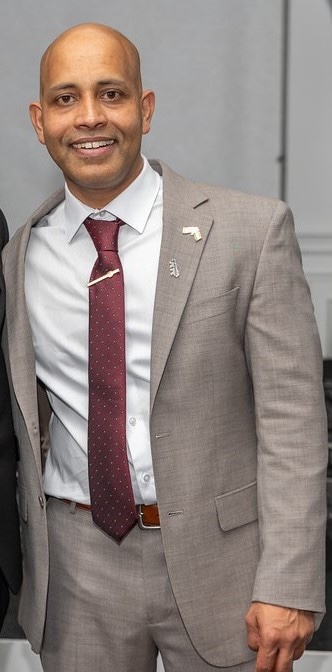
Sibu Nair
Deputy Director of Asian American Affairs, Office of New York State Governor Kathy Hochul

Sibu Nair serves as the deputy director of Asian Affairs in Governor Hochul’s administration. His journey from a role at the University of Buffalo to founding CHAI, a nonprofit dedicated to celebrating Indian heritage in Upstate New York.Through initiatives like establishing the first cricket ground in Erie County, organizing the grand “India Mela.” Uniting the AAPI community across NY State and installing the first Gandhi Monument in WNY, Nair has played a pivotal role in enriching the Asian American community’s cultural landscape.
If you could give your younger-self advice, what would it be?
I would advise my younger self that pursuing good in the world is often met with resistance, and such moments can shake one’s resolve. However, the lesson I’ve learned – and would share – is to stay true to your values and advocate for causes that benefit everyone. It’s about holding your head high, undeterred by criticism, and making a positive impact despite the challenges.
Do you have any event/movie/music suggestions for our readers to check out in celebration of AAPI Heritage Month?
I recommend the Bollywood classic, “Lagaan” (2001). This film goes beyond the sport of cricket to illustrate a tale of resilience, unity, and triumph against oppression in a drought-stricken Indian village of the 19th century. It beautifully portrays hope and perseverance, themes that resonate deeply within many stories of the AAPI community. For an authentic experience and a glimpse into India’s enduring love for cricket, accompany your viewing with popcorn and samosas.
How has your heritage shaped the person you are today?
Arriving in Buffalo when the Indian presence was minimal, I embraced the chance to share and learn from diverse cultures, embodying the “City of Good Neighbors” ethos. My Hindu upbringing, emphasizing spiritual and karmic principles of acceptance and humanity, has profoundly shaped my ability to appreciate and assimilate diverse cultures. This heritage has been a cornerstone of my identity, enabling me to engage in my professional and social life with openness and without prejudice.
What can New York policymakers do to support the AAPI-community in the short-term? In the long-term?
New York’s acknowledgment of the Lunar New Year and Diwali as public school holidays marks a significant step towards inclusivity, recognizing the cultural importance of these festivals to the AAPI community. Long-term support could include policies aimed at combating hate crimes and discrimination, thus ensuring a safe, valued society for all communities. Further, enhancing civic engagement, supporting AAPI businesses, and promoting cultural awareness can help dismantle stereotypes and foster inclusivity.
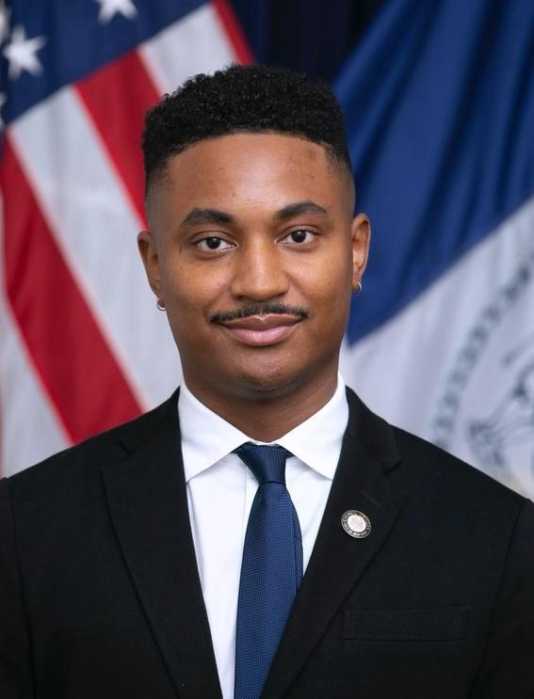
Chi Ossé
City Council Member, New York City Council

Chi Ossé is the Council Member for New York City’s 36th District, representing Bedford-Stuyvesant and North Crown Heights. He entered politics as an organizer and prominent figure in the Black Lives Matter movement. At 23 years old, Ossé was elected in 2021 as the youngest member of this Council and its only member hailing from Gen-Z.
What can New York policymakers do to support the AAPI-community in the short-term? In the long-term?
We are working to pass the Fairness in Apartment Rental Expenses (FARE) Act. The bill would require that, in rental transactions, whichever party hires a broker pays the broker fee. Currently, the tenant is often saddled with the fee for a broker they did not hire, and that unfair system has to end. If you support this bill, you should reach out to your elected officials and take to social media to be heard!
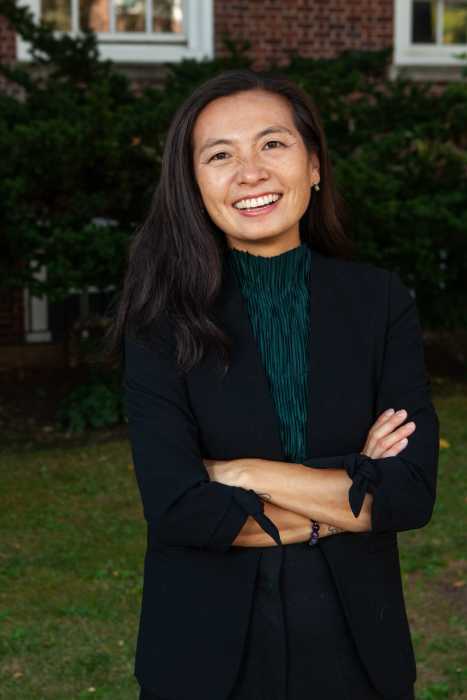
Yung-Yi Diana Pan
Interim Executive Director, Asian American/Asian Research Institute - AAARI

Yung-Yi Diana Pan is interim executive director of the Asian American/Asian Research Institute – CUNY (AARI). She is also faculty in the department of sociology at Brooklyn College. Diana is a 1.5 generation immigrant who grew up in Oregon, where her childhood experiences and observations shaped her research interests. Broadly, Diana examines how inequalities persist for Asian American and Latinx lawyers, physicians, and academics. Diana is passionate about impactful research that serves to uplift communities.
If you could give your younger-self advice, what would it be?
Take advice from people but also tailor it to what works best for you. Understand that each person’s experiences, backgrounds, and responsibilities will alter their perspectives. Triangulate multiple people’s advice to arrive at your own conclusions. Also, life is a marathon, not a race. It is okay to take your time and not race through educational benchmarks. Lastly, find a hobby that not only brings you joy, but is also separate from work responsibilities.
Do you have any event/movie/music suggestions for our readers to check out in celebration of AAPI Heritage Month?
The AAARI Symposium is on May 17th at the CUNY Law School — check the AAARI website for updates and registration. Our theme this year, “Interrogating AAPI Identities,” complicates how, where, when, and why we may consider and deploy intersecting ethnic, religious, and gender identities. As for a movie suggestion, I recently watched “Past Lives” and highly recommend it! I think it smartly looks at the multiple layers of migration, adaptation, and unresolved emotions.
How has your heritage shaped the person you are today?
Being Chinese/Asian American defines my life. Growing up in Oregon, I simultaneously felt marginalized, exoticized, and foreignized, but nevertheless found ways to adapt. College empowered me as an Asian American woman. I met impressive professors and mentors (some with whom I am still in touch today), and they were role models for my own growth as a person. Living in California and New York further colored my perspectives and learning as to AAPI history and experiences.
What can New York policymakers do to support the AAPI-community in the short-term? In the long-term?
The AAPI-community is largely rendered invisible in New York State, although there have been advances through continued advocacy and research. In the short term, policymakers can support the implementation of AAPI curriculum in K-12 schools. Ignorance of this history results in an incomplete understanding of U.S. history. In the long-term, including AAPIs in reporting disaggregated data on research pertaining to health, education, and politics. This data will reveal inequalities within and among the broad AAPI-umbrella.






